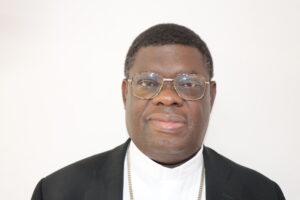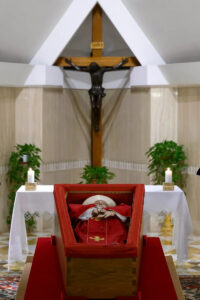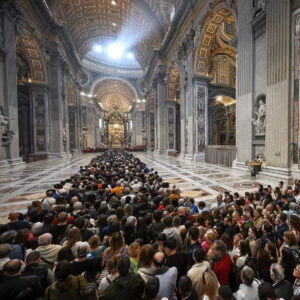UGANDA: A Call to Serve the Neediest in Society: a Story of Fr Lazar Arasu, SDB
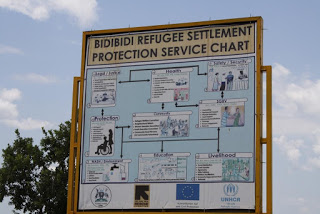
Out of curiosity, he visited the refugee settlement camp in Palabek. It was on a Sunday, the Feast of Corpus Christi. What he saw and heard moved him to tears. When he went back to his residence in Gulu town where he had been teaching, he made a resolution. Like the Apostles called by Christ to come follow him, he resigned from his teaching post at the Catholic University in Gulu and went ahead to live among the refugee at Palabek settlement. Here is the story of Fr. Arasu SDB, who is rebuilding the lives of refugees in Palabek Refugee Settlement.
Rebuilding Lives of Refugees in Palabek
The presence of refugees and immigrants is a reality in the world of today. The number of refugees today seems to be the highest in human history. People become refugees due to civil war, various forms of violence, political instability, economic uncertainty, instability due to human, natural and ecological disasters and human rights violations. People move in search of better life away from one’s own homeland.
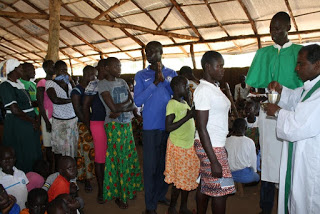
Every refugee is in want of everything. They need personal security and safety, food, clothing, shelter, education and all that is needed for human survival. These unfortunate displaced people are often at the mercy of the host country and the aid agencies. While there are many good hearts dedicating their lives for the betterment of the refugees, regrettably many registered Charities and Organizations look for opportunities to harvest riches and push their own agenda. The refugee situation could be an opportunity for Church and other Faith-Based Organizations to give witness to their faith.
Refugees stand in need of all the acts of mercy, which every Christian can exercise. These vulnerable people are hungry, thirsty, naked, sick, lonely, imprisoned in strange situations and many lose their lives. Refugees often call out to the Consecrated Religious Men and Women to stand by them. Indeed, it is a great opportunity to exercise Religious institutes’ charisms and objectives in a concrete. The Religious Sisters, Brothers and Priests are in a better position to reach-out to the refugees without looking for any reward or personal gains.
How I became a minister for the refugees
Reaching out to refugees in Palabek in northern Uganda has been a moving experience for me for the past one year. I consider this a special inspiration and a call from God to exercise my priestly and pastoral ministry to the most vulnerable in the world of today. Since young people dominate the refugee population, it is an apt way to exercise my Salesian vocation, serving the youth in vulnerable situation. I thank God for this experience and his grace showered on me and through me to my Institute that has taken up this ministry in a larger scale in Uganda.
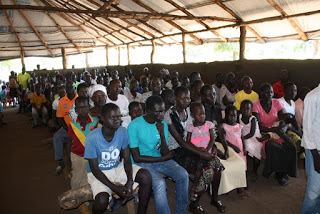
The very Refugee Ministry has been very providential for me. I was serving at a Catholic University in Gulu, the largest town in Northern Uganda. The ministry began on 18 June 2017, on the Feast of Corpus Christi—Body and Blood of Christ. The Superior General of the Salesians of Don Bosco had asked the Salesians working in Uganda to see if it is possible to offer some services to the refugees from South Sudan who were already about a million in population. I went to visit the Refugee Settlement in Palabek out of curiosity!
As we entered the Settlement, moving around by car, and I found a group of about 100 Christians praying under a large tree. I stepped out of the car and walked straight in front of the praying Christians, holding my Mass Kit. Catechist Mr. Eugenio, who himself was a refugee, led the para-liturgy. He was engrossed in prayer with closed eyes, seated on a piece of tree. He had finished preaching and two little girls were collecting offertory using a piece of cloth. I tapped the shoulder of the Catechist. When he looked up, I said, “I am priest and I would like to celebrate Mass.” With awe he exclaimed, “It is a miracle!” He commanded the choir to start the entrance hymn right away. All eyes were focused on me, wondering whom this Indian priest is, and what is happening to them.
As I began the Mass, I asked them when they had attended Mass previously. They said that it was for the Feast of Corpus Christi in 2016, a year ago! The singing was full of joy and wonder. Many asked for absolution so that they could receive Holy Communion. At the end of the Mass they asked if I could come again to celebrate Mass with them the following week. Without a second thought I said, ‘Yes, I will come.’ After exchanging telephone numbers, some pleasantries and listening to their stories, I came back to my residence in Gulu, which is about 100 kilometres from Palabek, in Lamwo District.
In the middle of the week, I received a call from another leader of a Catholic refugee community, Mr. Robert, He inquired, “We are a large community in another zone and we would like to have Mass, would you come?” I replied, “When I finish Mass with my Catechist Eugenio’s group, I will come and see you.”
The following Sunday set a phase for my imminent ministry. A group of over 300 people, mostly adults, gathered under a large Butter tree, patiently waiting for me, singing songs. It was one of the moving liturgies in my priestly ministry. At the end of the Mass, a woman leader spoke up, “We are here in this wilderness for over three months, not visited by any priest; and having been left alone amidst non-Catholics, our heads were down. Now that we have seen you, our heads are up. God has visited his people!”
These words moved me to tears and brought me to the refugee camp every week. We had wonderful liturgies every Sunday, and sometimes we had meetings on weekdays. The Catholic community built a little hut for me to live. From August to December 2017 Catechist Eugene hosted me in his little home; he cared for all my needs.
Refugees Situation in Uganda
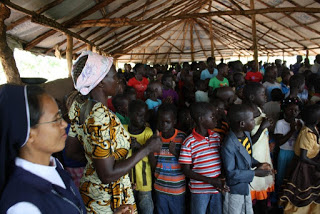
Uganda hosts over one million refugees, majority of them coming from South Sudan. Others come from Democratic Republic of Congo, Eritrea, Somalia, Burundi and few other countries. It is said that Uganda leads in hosting refugees. In welcoming the refugees, the credit goes to the ordinary, often poor citizens of Uganda rather than anyone else. In spite of the large number of refugees, no conflict has been reported among the host communities and refugees.
Large camps are situated in the north-west districts such as Arua, Yumbe, Adjumani and Moyo each having hundreds of thousands of refugees. Palabek Refugee Settlement is in mid-north of the country in Lamwo district. It has about 42,000 refugees settled in eight zones. Zones are further divided into Blocks. Each block may have over 100 households. Each household has five to seven persons, not necessarily belonging to a family. Each household is given a plot of land measuring approximately 30 square meters. In the given land they build their little hut, a latrine and cultivate some food. They call it ‘Settlement’ because people will live there as long as they want.
The settlement started in March 2017 and people are arriving in hundreds up to today. Women and children are the highest population, seconded by young male adults and then the elderly men and women as the least. The settlement is full of young, adolescent girls. Often it makes me wonder, ‘What is their future? How can we be of service to them?’ The male adult population is small at the settlements and it is assumed that they are in their homeland, either guarding their property or fighting the warring factions.
On their arrival, a household is given one tarpaulin, few tree-poles, and a few metres of ropes, a set of cooking utensils, a solar light and sleeping mats for each person. It is up to the refugee to fend for needs such as clothes and other necessities for daily living. Often the refugees arrive at the camp hungry, thirsty and with the clothes that they are wearing. In tears, they narrate many atrocities and human rights violations that they have gone through at the time of leaving their homeland.
Human life is not only food, clothing and shelter. Refugees are in need of security, education, psychosocial support and several other basic things for meaning living. People have been reduced to zero. They have lost their homes, properties, and above all their dear ones and their dignity as human beings.
Several agencies are involved in providing food, education and other livelihood. The Salesians of Don Bosco are offering the much needed psycho-social support and pastoral care to thousands of Christians. Salesians are also running four nursery schools for over 1000 little children who have not been taken care of for several months. They are in the process of constructing a Vocational/Technical Training Centre, with the intention of offering life-skills and preparing young people for employment in the near future. Currently there are four priests sharing the lives of refugees and living with them in little huts.
The presence of the Salesians and Maryknoll Missionaries has been a period of grace for refugees! Several hundreds of infants and children have been baptized. Preparations for other sacraments are under way. Sunday Liturgies are celebrated in nine little chapels, mostly under the trees. Training programmes and peace education for catechists, youth leaders and animators have begun. Conversations with refugees reveal that conflicts and wars are going on due to intolerance among tribes, lack of leadership in the communities and civil societies, and lack of civic education and skills for life.
Refugee Ministry ought to include integral formation of refugees to meet their needs of daily life, education, building their character and giving them spiritual accompaniment that will shape their life. All these need planning, resources and personnel.
∽End∽
